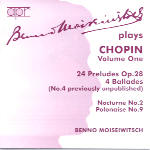Benno Moiseiwitsch’s 1948 Chopin Preludes never have been reissued complete until now (Nos. 11-24 appeared on an old RCA Bluebird LP in the early 1950s). This is big piano playing in every sense of the word. Passage work is unfailingly supple and relaxed yet always rhythmically centered and sung full out. How gorgeously Moiseiwitsch sculpts the F-sharp major Prelude’s curvaceous, cello-like left-hand song against the right hand’s main tune. Similar ambidextrous interplay illuminates the lyrical Preludes 4, 6, 7, 15, 17, and 21, while the pianist makes child’s play of No. 8 and No. 16’s tumultuous patterns. As an unabashed player of the old school, Moiseiwitsch makes no bones about slight textual amplifications, rhetorical accents, breaking of hands, and stressing inner voices. The alternate reading of the text in the Seventh Prelude derives from the once popular, now discredited Karl Klindworth edition. On the other hand, I suspect that it was Moiseiwitsch’s own impulse to take the Fourth Ballade’s descending right hand scale at measure 174 in thirds (he does the same thing in his 1958 stereo version, reissued in Philips’ Great Pianists of the 20th Century collection). Despite a number of inconsequential finger slips, I prefer this 1947 reading (recorded for HMV but never released until now) for its greater thrust and warmer, rounder sonics.
Headlong drama characterizes the First Ballade, along with unusual yet convincing dynamic shifts in transitional passages, and plenty of attention to left hand lines other pianists ignore. I’m a little bothered by the pianist’s broken octaves à la Paderewski, which seem more mincing than expressive in such a heroic opus. Likewise, I prefer a simpler treatment of the Second Ballade’s pastoral-like opening section to Moiseiwitsch’s purple prose, although the A minor section is appropriately powerful and agitated. No quibbles, however, concerning his elegantly spun Third Ballade–a marvel of tonal application, variety in color, and masterful timing. Moiseiwitsch’s pearly legato mesmerizes in the oft-played Op. 9 No. 2 E-flat Nocturne, while the slight B-flat Polonaise (composed before Chopin’s mature style took hold) benefits in this 1943 remake from superior sound and a steadier gait than the pianist’s rougher version from the 1920s. Note that Testament also has brought out the 1948 Chopin Preludes in a Moiseiwitsch compilation featuring diverse composers. Yet APR’s warm, vibrant transfers do full justice to the original 78s, and the annotations are informative and well written. Historic piano recording buffs won’t want to miss this enchanting release. [5/9/2001]
































